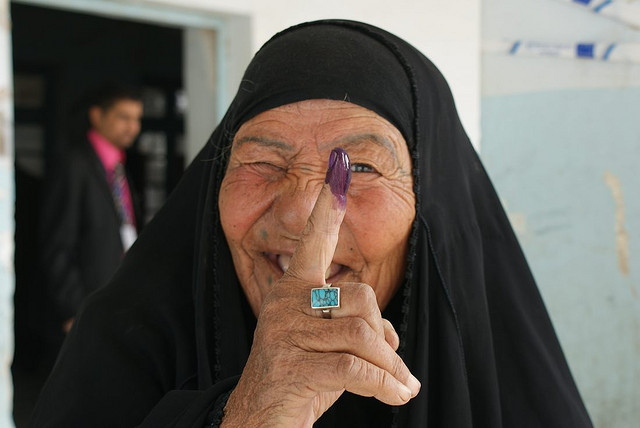Your Vote is your Voice: The 2014 Midterm Elections in the U.S.A Posted by jesa on Nov 4, 2014 in Arabic Language
Marhaba! As you might know already, on Tuesday November 4, 2014 millions of Americans are heading to voting polls (أقلام الإقتراع) to participate in the midterm elections (إنتخابات). You will come across a plethora of electoral campaigns (حملات إنتخابية), TV ads, flyers, Facebook and Twitter posts that promote the platforms of candidates (مرشُّحين) as well as their resumes. You will also come across many campaigns that remind citizens (المواطنين) of the importance of voting (الإنتخاب), along the lines of Did You Vote? Or You Should Vote! Or Exercise Your Given Right! Your Vote is your Voice! These elections are called midterm elections, because they are held two years after the election of the President of the United States (رئيس دولة الولايات المتحدة الأميركية). All 435 seats (مقاعد) in the United States House of Representatives (مجلس النواب) and 33 of the 100 seats in the United States Senate (مجلس الشيوخ) will be contested. Around 38 states (ولايات) will also hold state and territorial governorships. Some of the most important and pressing issues in the 2014 Midterm Elections include immigration (الهجرة), income equality (المساواة في الدخل), and Obamacare-formally known as the Patient Protection and Affordable Care Act.
Although the outcome of these elections is based primarily on how well both parties- the Republican Party (الحزب الجمهوري) and the Democratic Party (الحزب الديمقراطي) – are handling domestic issues in the United States, the consequences and effects of foreign policy issues and crises also play an important role. Midterm elections are regarded as a referendum (إستفتاء) that gauges the performance of the incumbent party (الحزب الحاكم) and the sitting President. The historical and statistical records demonstrate that in the last 21 midterm elections, the President’s party tends to lose an average of 30 seats in the House of Representatives and an average of 4 seats in the Senate. Many Americans have the chance to vote in U.S. consulates and Embassies (سفارات) if they happen to be abroad. In special circumstances, such as medical conditions or religious obligations, voters may be allowed to cast their vote earlier than the set Election Day. This is called Early Voting and voters can cast their vote by mail or in person in designated early voting stations.
Like in any other democracy (الديمقراطية), voting is a crucial pillar that ensures a somewhat fair representation of the large masses. The voting process according to certain timelines ensures a level of accountability (المحاسبة) and transparency (الشفافيّة) that not only compels elected representatives to perform their duties, but also allows citizens to partake in how they want be governed and how they determine the future of their society. Although democratic transitions sometimes follow bloody revolutions, riots, coups or foreign intervention or a just a mix of these factors, it still takes decades for a genuine and true consolidation of democracy based on the rule of a law and a powerful civil society. Many around the world are pessimistic about the chances of democratization in the Arab world following the Arab Spring due to what they view as incompatible ideologies between democracy and religious beliefs, and what some have termed as a clash of civilizations. Honestly, I tend to be more optimistic and view that everyone around the world regardless of race, religion, location, and social class are freedom loving and will strive to attain what they view as a representative, fair, and accountable system.
Stay tuned for upcoming posts.
Have a nice day!
نهاركم سعيد

Build vocabulary, practice pronunciation, and more with Transparent Language Online. Available anytime, anywhere, on any device.
About the Author: jesa
Salam everyone! Born as an American to two originally Arab parents, I have been raised and have spent most of my life in Beirut, Lebanon. I have lived my good times and my bad times in Beirut. I was but a young child when I had to learn to share my toys and food with others as we hid from bombs and fighting during the Lebanese Civil War. I feel my connection to Arabic as both a language and culture is severing and so it is with you, my readers and fellow Arabic lovers, and through you that I wish to reestablish this connection by creating one for you.







Comments:
yahya ibn imeel talib beljikii:
Barakullahu fiek
jesa:
Thank you yahya 😉